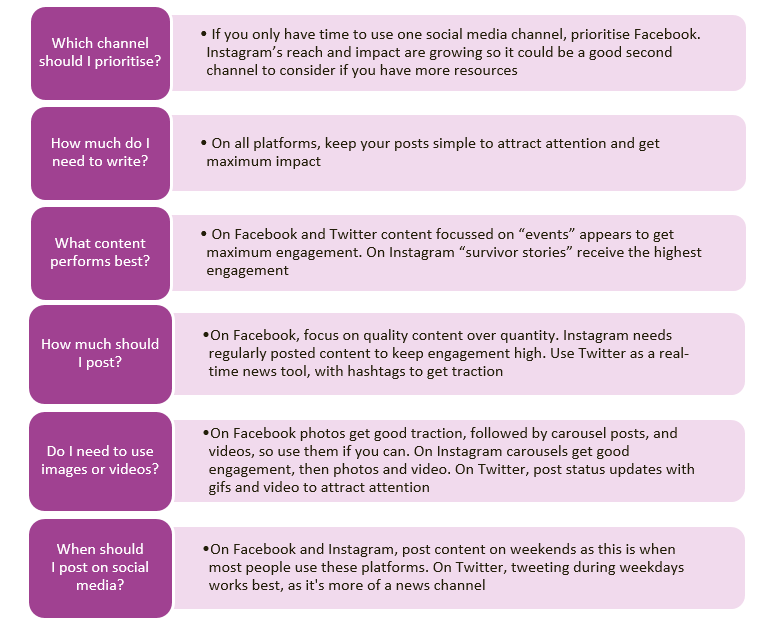Maximising impact on social media: insights for advocates from global research on social media engagement – September 2020
Introduction
Social media channels are increasingly important for advocacy, with billions of people active on social media around the world. They have also proven to be an effective way for patient organisations to communicate with patients during the COVID-19 pandemic.
In 2019, the Global Lung Cancer Coalition (GLCC) commissioned a ‘social listening’ project to look at what people are talking about online in relation to lung cancer. The research was run across 11 countries spanning six continents and looked at which channels, formats and types of content people find most engaging. The project comprised of two phases, a listening exercise and an analysis of social media channels.
This document summarises the project’s findings and makes recommendations to help advocates design impactful campaigns and improve engagement on the most powerful and widely used social media channels: Facebook, Twitter and Instagram.
Recommendations for advocates
When planning engagement, we recommend advocates consider the following four questions:

The Top tips below include key differences between Facebook, Twitter and Instagram, and may help advocates to improve engagement on social media platforms:

The GLCC has produced a guide for advocates on social media engagement. For more information, please contact the secretariat on glcc@roycastle.org.
Key findings from the social listening exercise
Researchers analysed public posts from Twitter, Instagram and blog fora (but not Facebook) to determine the subject of lung cancer discussions. Three trending topics were identified for each country. These varied between countries, but there were four recurrent themes: survivor stories, smoking, pollution, and medical innovation:
- Survivor stories (8% of the global conversation): the content of these stories was different between countries. For example, in the USA, stories which gained high engagement had a fundraising ask to them. In Israel, the majority of users sought advice on how to manage lung cancer
- Smoking (7% of global conversation): conversations often focused on how to quit smoking. However, there were signs that, in some countries, there is still a need to address the stigma of lung cancer
- Pollution (5% of global conversation): users discussed potential links between pollution and lung cancer. In Australia, people were concerned about the effects of burning coal. In Brazil, people were worried about how asbestos could damage their health
- Medical innovation (5% of global conversation): posts on advances in cancer gained high engagement. Immunotherapy, new treatments and lung cancer screening were popular topics globally
Key findings from the analysis of social media channels
The analysis of social media channels looked at posts from 35 GLCC members, and examined where and what type of content was posted and how engaging it was for social media users. The analysis found:
- Over 90% of the social media content produced by advocates was on Facebook and Twitter
- Facebook is the most engaging platform for social media users, with 72% of engagement, while Twitter had only about 11% of the engagement (despite having a comparable volume of posts)
- Twitter had the highest volume of posts, but trailed behind both Facebook and Instagram in average engagement per post
- Instagram had a much lower proportion of 7% of posts, but had the highest level of engagement per post
- Images, videos and photo carousels attracted high levels of engagement (and may help to explain Instagram’s increasing popularity)
- Five subject themes were identified in the content organisations were posting about: studies, research and information; events; fundraising initiatives; medicine, technology and treatment; and survivor stories
- Across all channels, the largest volume of content was on the theme of studies, research and information. However, posts on events and medicine, technology and treatment receive the highest engagement
Methodology
In the listening exercise researchers examined data from Twitter, Instagram and blog fora in eight GLCC member countries – Australia, Brazil, Canada, Israel, Russia, South Africa, UK, US – plus China, India and Poland. The content of public posts was analysed, along with what was trending on social channels and how often lung cancer topics were mentioned online. Facebook data was not included due to privacy constraints. Data was collected between November 2018 and May 2019 using Brandwatch, a social media monitoring tool. Over 350,000 pieces of content were gathered from more than 200,000 unique users.
Social media analysis was undertaken using Antelope, a social media analytical tool, to examine posts from 65 organisations (including 35 GLCC members) between 1 June 2017 to 31 May 2019. Researchers looked at content and tactics being used by advocacy groups on 124 social media accounts across Facebook, Twitter, YouTube, Instagram and Pinterest. The analysis included more than 54,000 public posts engaging 2.3 million users (measured in likes, comments and shares).
Country level briefings, which can downloaded in pdf format:
For more information, please contact the secretariat on glcc@roycastle.org.


